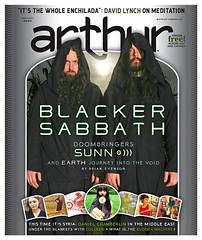Future of Arthur Magazine looks bleak
Citing financial difficulties, editor Jay Babcock announced the counter-culture magazine would cease operation. But his partner isn't so sure.

By Kevin Bronson
Times Staff Writer
February 23, 2007
Arthur magazine, the bimonthly counterculture journal that brought an underground sensibility to its coverage of music, politics, arts and culture, has ceased publication, at least for now.
Editor and co-founder Jay Babcock said the free magazine, which distributed about 50,000 copies in 120 cities nationwide, was calling it quits after 25 issues in four-plus years.
But Arthur's other co-founder, East Coast-based Laris Kreslins, said, "I'm not ready to declare Arthur dead. I'd much rather say it's on indefinite hiatus." A split between Babcock, who ran the editorial operation out of his Atwater Village home, and Kreslins, whose Maryland-based company holds the trademark and handled the business side, became inevitable last year.
"I had been wanting to transition out of doing the magazine for quite some time," Kreslins said. "But negotiations to sell my equity in the magazine fell apart."
Babcock, who had assembled investors to acquire the magazine outright, said, "I looked out for everyone's interests but mine. I went on trust, and when that crumbles, everything else fails."
Asked whether he could resurrect Arthur, Babcock said: "No. . . . I'm broke, I have no income, and I don't even have the rights to my baby." Kreslins said he was preparing a public statement that he would issue Sunday.
In many ways, Arthur harked back to the underground publications of the 1960s and '70s. It featured interviews, essays, cartoons and lengthy pieces from writers such as Douglas Rushkoff, Alan Moore, Erik Davis and Kristine McKenna, as well as regular columns by Sonic Youth front man Thurston Moore and blues man T-Model Ford.
The magazine in the last two years also mounted three music festivals that earned notice in the Los Angeles Times, the New York Times and other publications.
Kreslins said the magazine "wasn't making money, but it wasn't bleeding money either, especially when you consider what an interesting, unique situation it was."
Babcock said he felt worst for the magazine's myriad contributors, many of whom worked for no pay. "I had a lot of people working on good faith," he said.